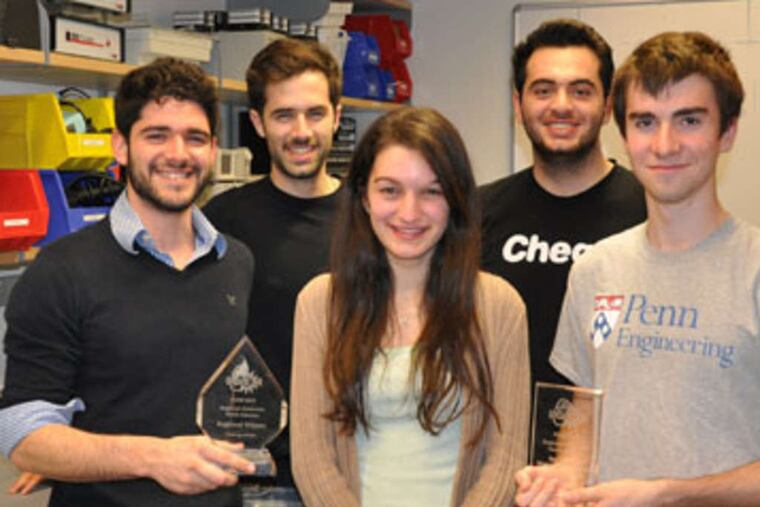Penn iGEM team leaders in synthetic biology
By day, they attend classes like any other college students. By night, they're in the lab, engineering genetic code.

By day, they attend classes like any other college students. By night, they're in the lab, engineering genetic code.
Penn iGEM, a team of five undergraduates at the University of Pennsylvania, spent seven months developing a project to help scientists better understand and control a process known as gene expression.
The team entered its research in the International Genetically Engineered Machine (iGEM) competition against other undergraduate groups proposing ways to improve society through biotechnology.
In the North American regionals in Toronto early last month, Penn iGEM bested nearly 70 contenders to win the grand prize. The team, however, didn't place at the world championship on Nov. 4 at the Massachusetts Institute of Technology.
The members - Danny Cabrera, 21; Mahamad Charawi, 19; Danielle Fields, 20; Brad Kaptur, 19; and Josh Tycko, 22 - contributed a range of expertise, from bioengineering to computer science. They conceived a project for development of engineered proteins that could silence targeted genes using DNA methylation.
"IGEM teams want to contribute to the field of synthetic biology, which aims to engineer genomes in ways that can create new drugs, biofuels, and biomaterials," said Tycko, a senior majoring in biological mathematics. "We wanted to contribute . . . a toolbox that would enable a new way of regulating engineered genomes."
For now, their research is useful within the field, but its potential impact could extend far beyond that. "In the long run, you could use it to treat diseases," said Cabrera, a computational biology major. But that's a long way off, "definitely in the decades."
Just as hackathons provide a forum for computer programmers to compete and collaborate, the iGEM competition gives an intensive opportunity to young scientists working in synthetic biology.
Such hands-on lab experience is rare for undergraduates, according to Fields, a third-year bioengineering major.
The iGEM program "gives students a unique opportunity to own their research project, from conception to execution," said Brian Chow, the team's primary faculty adviser and an assistant professor of bioengineering at Penn.
"Oftentimes you give undergrads that kind of freedom," he added, "and it's a train wreck."
Part of Penn iGEM's research was community outreach. Last April at Clark Park in West Philadelphia, the team participated in Discovery Day, a science exposition for children organized by the Philadelphia Science Festival.
Across the team, the science bug had bitten early. Charawi, a sophomore in the management and technology dual-degree program, can't recall when he didn't love science.
At Discovery Day, they shared that passion with what they hoped would be an up-and-coming generation of homegrown future scientists. Their contribution was a DNA extraction experiment. Using such household items as dish detergent and food coloring, the team showed children how to take cells from their cheeks, and extract the DNA to observe in a test tube. It was as easy as swishing around a mouthful of salt water.
"We wanted to show them that biology is not something purely theoretical - it's very applicable to your daily life," Charawi said. "We wanted to get something in their hands that gets them really excited about science."
Early on, in kicking around ideas for the iGEM project, the team reached out to experts around Philadelphia for counsel. For instance, though they wound up going in another direction, they contacted a local composting facility to learn about the role of bacteria in compost breakdown.
"Part of the point of iGEM is connecting synthetic biology with community outreach," said Kaptur, a sophomore majoring in bioengineering. "Synthetic biology is assembling biological parts to create useful constructs. The future of synthetic biology is utilizing these created biological constructs for useful applications."
Along the way, there were "a lot of all-nighters," Fields said. The team consumed so much Red Bull that the company sent a couple free cases of the energy drink.
Yet "despite the temporary loss of a social life," Tycko said, "we all agree that we've never learned so much in such a short amount of time."
The iGEM competition may be over, but the team's work is not. The members hope to publish their project in a scientific journal. They already have opened their DNA research to the public, so other scientists can pick up where they left off.
"It is our hope," Tycko said, "that our collaborators in Penn's medical center and elsewhere will be able to use this to accelerate their own research on human disease."